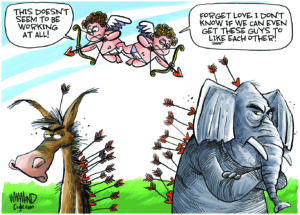Joe Conason: Bush’s Defeated Bluster on Iraq
The president's attempt to whitewash "stay the course" from the nation's collective memory is emblematic of the bankruptcy of his administration's policy on Iraq.Fear of a humiliating electoral defeat has now revealed the confusion and incoherence long hidden behind the bluster of Republican war rhetoric. As the White House and its congressional allies face an angry America, the disturbing truth can no longer be concealed. Waving the flag and questioning the patriotism of critics don’t distract the public from their failures in military strategy, diplomacy and planning.
These shallow politicians have never known what they were doing in Iraq. They can’t agree whether Iraq is sinking into civil war or is merely on the brink of chaos. They have punted the policy issues — which are supposed to be formulated by the National Security Council, the Pentagon and the State Department, not to mention the president himself — over to a “commission” chaired by former Secretary of State James Baker III, which conveniently will not report any recommendations until after the midterm election.
Meanwhile, two weeks before Election Day, George W. Bush and his spokespersons have abandoned “stay the course” as their political slogan for Iraq policy. We were either supposed to believe they never uttered that obtuse phrase, which was recorded emerging from their mouths on many, many occasions — or at least that those three words never expressed what the president meant, anyway.
On ABC News last Sunday, Bush said that “we’ve never been ‘stay the course,’ ” and he was soon followed by Dan Bartlett, the White House communications director, and Tony Snow, the press secretary, offering up equally ridiculous claims.
According to Snow — who must be the most aptly named man in Washington — the president stopped saying “stay the course” because “it left the wrong impression about what was going on. . . . The president is determined not to leave Iraq short of victory, but he also understands that it’s important to capture the dynamism of the efforts that have been ongoing to try to make Iraq more secure, and therefore, enhance the clarification — or the greater precision.”
All this fine mincing of words would be uproariously funny if only so many people weren’t getting killed and wounded to make Bush feel resolute. Darkly farcical too is the spectacle of Republican officeholders who once parroted the presidential squawking about “stay the course” or “cut and run,” and who are abruptly pretending that they too have something new to say about the war.
But do they? As we listen to the worst American casualty reports in two years and our military command’s candid admission that the effort to secure Baghdad from violence has failed, there are no viable plans emanating from the White House or Congress. Instead, the latest diversion is an Iraqi government promise to devise a plan before the end of the year to take over most security responsibilities from the U.S. by 2008.
Sen. John McCain still prescribes more boots on the ground, though he won’t say how many. Sen. Lindsey Graham admits that Iraq is on the verge of chaos but can’t say what he would do differently. The Republicans desperately seek to create an appearance of change without any change in substance. They are fleeing the policy that they used to win the last midterm election, in 2002.
It is long past time for the president to stop attending to the vice president, the secretary of defense, Jehovah, Beelzebub, Karl Rove or whoever has been providing such poor advice about the war. He would do better to start listening to other voices, including Democratic diplomats, retired military officers and perhaps even the Iraqis themselves, who favor American withdrawal by an overwhelming majority.
If there is a decent path out of Iraq, the first step is to demand immediate negotiations among all the religious and ethnic factions (except Al Qaeda) as a condition of American aid. And those negotiations must begin with everything on the table, including an eventual timetable for the departure of foreign forces. Although American officers and diplomats have been talking regularly with the Iraqi insurgents for many months, they haven’t really had much to discuss, because U.S. policy remains stuck on “stay the course.” That must change.
Whether the Iraqis can work out their issues without still more years of bloodshed is unclear. We can encourage them by insisting on negotiations between the insurgents and the Iraqi government — with an explicit promise that success would lead to our rapid withdrawal.
Americans and Iraqis today agree on one thing above all: There has to be a limit to the blood and treasure expended on this misbegotten adventure.
Joe Conason writes for the New York Observer (www.observer.com). To find out more about Joe Conason, visit the Creators Syndicate website at www.creators.com.
Your support matters…Independent journalism is under threat and overshadowed by heavily funded mainstream media.
You can help level the playing field. Become a member.
Your tax-deductible contribution keeps us digging beneath the headlines to give you thought-provoking, investigative reporting and analysis that unearths what's really happening- without compromise.
Give today to support our courageous, independent journalists.






You need to be a supporter to comment.
There are currently no responses to this article.
Be the first to respond.